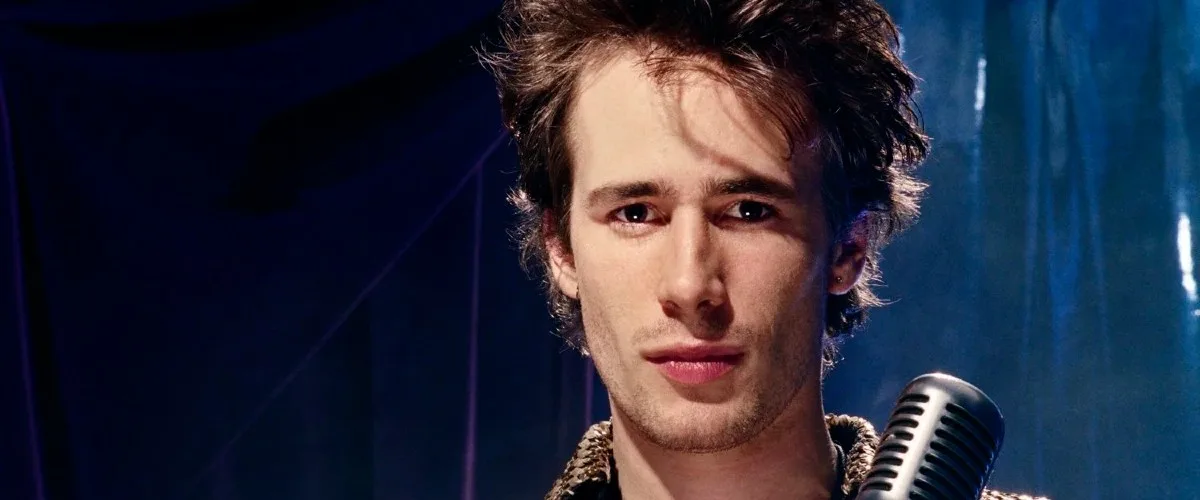
The indie musician Jeff Buckley died in 1997, but to his friends and loved ones, the pain is still quite raw. Some can’t bring themselves to listen to his music. When they speak of him, they inevitably tear up. And they have saved the heartfelt, sweet, somewhat shambolic messages he was fond of leaving on their answering machines.
As the new documentary, It’s Never Over, Jeff Buckley, makes clear, Buckley was a sensitive, curious, and creative soul. He scribbled song lyrics, thoughts, and drawings (some animated in the film) in a zine-like journal. He had a child-like fascination with the world. He was the kind of young man people fell in love with instantly, sometimes despite themselves.
Buckley also had a remarkable voice, similar to one of his great heroes, Robert Plant. (“Love, anger, depression, joy, and Zeppelin” was one of his mottos.) He took himself very seriously, as talented and artistically ambitious young men in their 20s tend to do—and the people in his life loved and indulged him in equal measure.
The movie, and Buckley himself, feels very much of its time—and not just because of those answering machine messages. He rose to fame in the early ’90s, in an era when selling out was the worst thing an artist could do. It was still a thing to be counterculture, as there actually was a dominant culture to rebel against. (Ah, those were the days.) Buckley also played with ideas of gender, much like Kurt Cobain. He wore a glittery shirt jacket on the cover of his album that the label found too feminine (he ignored them; the jacket and that cover are now iconic). Another one of his great heroes was Nina Simone and he occasionally tried to channel her in performances. He sometimes called himself a chanteuse.
It’s no wonder the skinny, beautiful Buckley, who made music that combined folk with heavy metal, art rock, and crooning jazz, has become a posthumous Gen X icon. But the truth is, while his album sold well in America, it was hard to categorize and he was overshadowed by the likes of Nirvana and R.E.M. But he did break through abroad, especially Europe, and, of course, his aching cover of Leonard Cohen’s “Hallelujah” has become the definitive version of that song. (It rose to number one in 2008 after it was used in an emotional scene on The West Wing).
The great tragedy of Buckley is that he was always trying to separate himself from his famous musician father, Tim Buckley, who died of a heroin overdose at the age of 28. Jeff barely knew the man who took off to pursue his musical ambitions after getting a girl—Jeff’s mother, Mary Guibert—pregnant.
Jeff did eventually get to see his father perform and even spent a little time with him, shortly before Tim’s overdose. The loss of his father—first as an absentee parent and later in death—was a specter that followed Jeff throughout his life.
And he inherited not only his father’s fine features and mop of wavy hair but his voice and musical talent (“I have my father’s voice and my grandfather’s voice,” Jeff says shruggingly at one point, as if to emphasize the biology at play rather than some deeper connection). Indeed, he chafed at the idea that he was anything like his father. “With comparisons, I’m not understood,” he said.
It’s Never Over, Jeff Buckley, is a moving, if somewhat standard documentary featuring archival interviews with Buckley himself, lots of captivating footage of Buckley singing and recording, and a good number of intimate photos and recordings. There’s a wild sequence where Buckley climbs high onto the scaffolding above the stage when Led Zeppelin is performing in Glastonbury, freaking out his friends. Was it a death wish? An insatiable need to get as close to his idols as possible? (Buckley said he wanted to feel the vibrations of the music.)
Director Amy Berg talks to those who knew him: the somewhat eccentric Guibert, a coproducer on the film, as well as Buckley’s two most serious girlfriends, Rebecca Moore and Joan Wasser, and members of his band. Even the great Aimee Mann is interviewed (she was friends with him, too, though he apparently wanted to be more) and she also tears up when reminiscing about him. Moore, who had been a downtown New York performance artist, left her career and her life in New York after Jeff’s death, which has clearly scarred her. Wasser, a musician, can’t help wistfully talking about what could’ve been. “We were so young,” she says, her eyes glistening.
We’re struck by that, too. His girlfriends and old bandmates are in their 50s—certainly not young, but not quite old—which is how old Jeff should be. Instead, he’s gone, having died at 30 in a somewhat mysterious drowning incident while he was in Memphis recording his (unfinished) second album. Although he was depressed at times and would make provocative statements like “I don’t see myself 10 years from now” and “I’m not going to last that long,” his loved ones insist it was accident, not suicide. It’s important for them to hold onto that belief—that he wanted to be here, to continue making music, exploring, creating, living. Instead, he is frozen in time—and in some ways, so are they.
